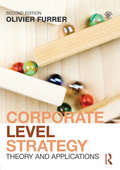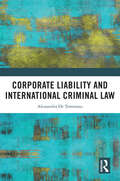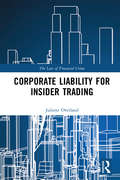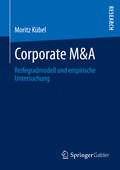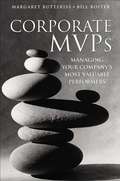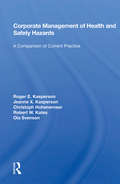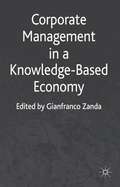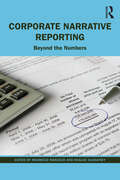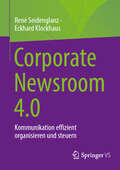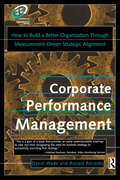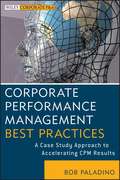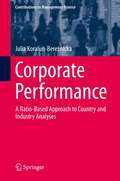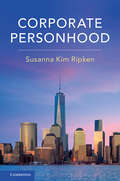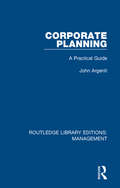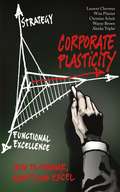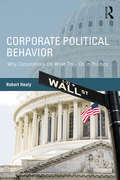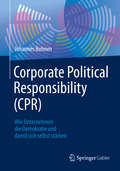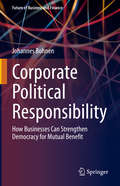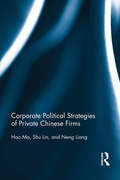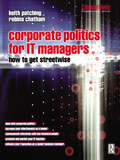- Table View
- List View
Corporate Level Strategy: Theory and Applications
by Olivier FurrerThe challenges faced by diversified corporations—firms that operate in more than one industry or market—have changed over the years. In this new edition, Olivier Furrer helps students of corporate strategy to consider the impact of critical changes in resources, businesses and headquarters roles on the firm’s ability for establishing and sustaining corporate advantage. New to this edition are stimulating pedagogical features and additional material such as a new chapter on the theoretical foundations of multibusiness firms, along with a host of new examples from across the world. A companion website supplements the book, providing PowerPoint slides, a test bank of questions, and lists of suggested case studies.
Corporate Liability and International Criminal Law
by Alessandra De TommasoThis book investigates whether corporate criminal liability should be incorporated within the scope of international criminal law. The work provides unique insight into the evolution of the debate on the international criminal liability of corporations to facilitate future discussion on the possibility of including corporations within the scope of international criminal law. It combines a detailed examination of Nuremberg and Rome with the examination of previously overlooked initiatives such as the Draft Code of Offences against Peace and Security of Mankind and the 1951 and 1953 Committees on International Criminal Jurisdiction. This analysis is also complemented by a review of significant post-1998 international and domestic developments around corporate criminal liability. In addition, it offers suggestions for the development of an amendment to hold corporations accountable under the Statute of the International Criminal Court. This book contributes to the existing literature on the topic of corporate liability which attracts significant attention from scholars in the fields of Law, Business, and Political Science. It will be useful to professionals in the academic and diplomatic fields, researchers, legal advisors, and business leaders. It will also be of interest to anyone who wants to understand the debate on holding businesses accountable under international criminal law.
Corporate Liability for Insider Trading (The Law of Financial Crime)
by Juliette OverlandCorporate Liability for Insider Trading examines the reasons why there have been no successful criminal prosecutions, or successful contested civil proceedings, against corporations for insider trading, and analyses the various rationales for prohibiting insider trading. It reviews the insider trading regulatory regime and describes its key features, using both national and international examples. The book inspects a variety of criminal and civil models of corporate liability and considers the historical and theoretical basis on which corporations are subject to insider trading laws. The specific elements of the insider trading offence and the manner in which they are attributed to corporations are analysed in detail. Defences available to corporations such as Chinese Walls are explored, and the obligations that are imposed on businesses as a result of insider trading regulation – security trading policies and notifications, continuous disclosure obligations, and duties concerning conflicts of interest – are detailed and examined. The book concludes with reform proposals intended to remedy the many legal and commercial difficulties identified, in order that a new regulatory regime might be adopted to better serve regulators, businesses, investors, and the broader market. This volume addresses these corporate law topics and will be of interest to researchers, academics, financial institution compliance officers, investment bankers, corporate and comparative lawyers, and students and scholars in the fields of commercial law, corporate law, financial crime, company law, and white collar crime
Corporate Liability for Transboundary Environmental Harm: An International and Transnational Perspective
by Kirsten Schmalenbach Peter Gailhofer David Krebs Alexander Proelss Roda VerheyenThis open access book aims to elaborate on the legal prerequisites to establish the liability of corporations for transboundary environmental harm, not only by identifying existing liability rules, principles and standards but also by analysing their potential for further legal development. The authors consider international and transboundary liability law to currently be an underutilised tool for international environmental protection. The book seeks to address this by exploring what is needed in terms of legislative action and identifying options for judicial pliability, thereby providing an important legal contribution in furthering the development of an effective international and transnational environmental liability law regime.
Corporate M&A: Reifegradmodell und empirische Untersuchung
by Moritz KübelParallel zur Entwicklung in der Praxis hat M&A seit den 1960er Jahren auch in der wirtschaftswissenschaftlichen Forschung zunehmend Beachtung erfahren. Wurden Unternehmensakquisitionen und deren wirtschaftliche Auswirkungen zunächst hauptsächlich aus finanzökonomischer Perspektive analysiert, so existieren inzwischen zahlreiche Untersuchungen aus unterschiedlichen Wissenschaftsdisziplinen und Forschungsperspektiven (z. B. Institutionenökonomik, Verhaltensökonomik, Lernforschung und Managementforschung). Insgesamt sind die Forschungsergebnisse zu M&A aber sehr fragmentiert, inkonsistent und lückenhaft. Es besteht nach wie vor großer Bedarf an weiterer empirischer Forschung, um die Erfolgsfaktoren von Unternehmenszusammenschlüssen besser zu identifizieren und relevante Praxisempfehlungen ableiten zu können. Die vorliegende Untersuchung ist fokussiert auf die Unternehmensebene als die relevante Betrachtungsebene und analysiert Charakteristika der akquirierenden Unternehmen. Forschungsziel ist ein theoriegeleiteter und empiriebasierter Beitrag zum wissenschaftlichen Verständnis von Serial Acquirern und zur Verbesserung ihres Leistungsvermögens in der Praxis.
Corporate MVPs
by Bill Roiter Margaret ButterissCorporate MVPs create extraordinary value for the organization by consistently exceeding expectations. MVPs produce tangible and dramatic business results; they improve the people they work with and the organization in which they work. In fact, the future of your business depends on this 5 to 10 percent of its very best people. But far too often, MVPs are lost because of management missteps, or even by no management at all. Based on in-depth interviews with senior executives and business owners, HR professionals and executive recruitment firms, and with MVPs themselves, Corporate MVPs explores what makes these talented individuals tick, how to develop and cultivate them, what it takes for someone to become an MVP, and the important role of HR in managing this key talent.
Corporate Management Ecosystem in Emerging Economies: Global Perspectives
by Fred A. Yamoah Adnan Ul HaqueEmerging economies, as actively changing societies, invoke questions about the future direction for national and global development as well as equitable economic growth. In this book, the Editors argue that understanding the corporate management ecosystem of emerging economies is key to business success in the globalized economy.Discussing the key attributes of emerging economies (for example, population dynamics, labour and production patterns, employment, and foreign direct investment) and the connection with governance, marketing, innovation management, and supply chain research and practice, the book highlights the distinctiveness of corporate management dynamics in comparison with existing knowledge that is dominated by developed country frameworks.The book offers twenty-one case studies that cover examples of corporate management research and practice in both local and international companies, making this a valuable resource for students, academics and industry stakeholders.
Corporate Management Of Health And Safety Hazards: A Comparison Of Current Practice
by Roger E. KaspersonThis book provides one of the first systematic accounts of how corporations manage risk to workers and consumers. Careful analysis and interviewing in different corporations elicit a portrait of the myriad hazards that currently confront industry, the corporate programs and resources that have emerged since 1970 to respond to this challenge, and factors that have contributed to successes and failures. In-depth studies of the Volvo Car Corporation, Rocky Flats nuclear weapons plant, Union Carbide's Bhopal facility, and large chemical and pharmaceutical corporations provide a state-of-the-art assessment of the advances and problems inherent today in industrial safety management. Roger E. Kasperson, Jeanne X. Kasperson, and Christoph Hohenemser are senior researchers at Clark University's Center for Technology, Environment, and Development (CENTED). Roger E. Kasperson is Director of CENTED and its Hazard Assessment Group. Jeanne X. Kasperson is Research Librarian at CENTED and Senior Research Associate in Brown University's World Hunger Program. Hohenemser, a professor of physics, directs the Environment, Technology, and Society Program at Clark University. Robert W. Kates, formerly with CENTED, is Director of the Alan Shawn Feinstein World Hunger Program at Brown University. Ola Svenson, of the Department of Psychology at Lund University in Sweden, is a leading researcher in the field of risk perception and decision analysis.
Corporate Management in a Knowledge-Based Economy
by Gianfranco ZandaCorporate Management in a Knowledge-Based Economy traces the evolution of corporate governance over time, with a particular focus on the changing nature of power. The control of scarce resources used in production materials, labour and capital has evolved considerably over the past centuries, with government, landowners, non-owner managers, and institutional investors acting as controlling powers at different points in time. In order to appropriately protect the various, and changing, stakeholders, the system of corporate governance has also developed over the years a process that continues to the present. In today's knowledge-based economy, with the rising importance of intangible assets, a new corporate management paradigm is needed. This book incorporates theoretical work as well as practical applications to analyse these developments and explore emerging trends of the 21st century. It examines how the pursuit of profit maximization has resulted in governance failures and it focuses on the prospective role of business ethics (once again in the spotlight following the credit crisis) in helping reform flawed governance structures. It argues that, in the long term, a system based on ethics can maximize social responsibility, customer satisfaction, human capital development and economic targets.
Corporate Manslaughter and Regulatory Reform
by Paul AlmondThis book provides an account of the international emergence of corporate manslaughter offences to criminalise deaths in the workplace during the last twenty years, identifying the limitations of health and safety regulation that have prompted this development.
Corporate Narrative Reporting: Beyond the Numbers
by Mahmoud Marzouk and Khaled HussaineyThis book presents a comprehensive and expert-led insight into the role, types, practises and determinants of corporate narrative reporting (CNR). It provides a detailed overview of the importance of narrative disclosure in understanding the full annual report and, consequently, company performance and future prospects. CNR comprises integral information presented in the front half of the annual report, which helps to tell the full story of a business, providing a comprehensive overview and understanding of both its past and future performance. Supported with illustrative tables and figures throughout, this volume contains a plethora of carefully selected chapters, featuring the analytical insight of knowledgeable academics and researchers from all over the world. Using different data collection and analysis methods, it links and advances theory and practice in the disclosure and presentation of non-financial information in annual reports and other disclosure channels. The book is logically structured into four parts: Narrative Reporting: The State of the Art Empirical Research on Narrative Reporting Narrative Sustainability Reporting Narrative Reporting in Times of Crisis Providing a global insight into CNR in practice, Corporate Narrative Reporting is an invaluable resource for both students and practitioners interested or involved in preparing, reviewing/auditing, analysing and understanding annual reports. It should also be of particular interest to policymakers, regulators and investors.
Corporate New Ventures at Procter & Gamble
by Teresa M. Amabile Dean WhitneyConsumer products giant Procter & Gamble is faced with an urgent need to revitalize new-product innovation, given its recent focus on incremental product improvements and its aggressive growth goals. As part of this effort, the company's top executives form a small, autonomous, cross-functional Corporate New Ventures team led by a young former brand manager. Operating within a conducive work environment, the team invents a systematic approach to gathering information and producing creative ideas for radically new product categories.
Corporate Newsroom 4.0: Kommunikation effizient organisieren und steuern
by René Seidenglanz Eckhard Klockhaus(Corporate) Newsrooms stellen im Kommunikationsmanagement ein Phänomen dar, welches sich immer weiter verbreitet und zunehmend in der Praxis durchsetzt. Demgegenüber steht eine – auch in unserer Forschung ermittelte – große Unsicherheit über Planung, Organisation und Umsetzung solcher Newsrooms.Vor diesem Hintergrund wird der Band gleichwohl relevante theoretische und wissenschaftliche Aspekte und Vorgehensmodelle einbeziehen, etwa aus der Betriebswirtschafts- resp. Managementlehre. Gleichermaßen bleibt sie dem kommunikationswissenschaftlichen Diskurs verbunden und beschreibt wirtschaftliche und organisatorische Faktoren. Es wird ganz konkret Nutzenmodelle vorstellen sowie Handlungsempfehlungen und Vorgehensweisen vorschlagen. Dieses Buch geht damit über den Status Quo der Marktbeobachtungen hinaus und bildet die Brücke zwischen Anforderungen und Machbarkeiten ab. Es leistet eine ganzheitliche Betrachtung von (Corporate) Newsrooms durch Einbettung in wissenschaftlicheDebatten und feldspezifische Herausforderungen und ermöglicht praktische Reflexion und konkrete Umsetzung von (Corporate) Newsrooms.
Corporate Nudging: Chancen und Risiken (BestMasters)
by Cameli HoqueDieses Buch widmet sich der Frage, wie private Unternehmen die Erkenntnisse der Verhaltensökonomie nutzen und Nudges erfolgreich in der Praxis einsetzen können. Die Untersuchung zeigt, dass Nudges sowohl im Mitarbeitermanagement als auch bei der Beeinflussung des Verbraucherverhaltens eine große Palette an vielversprechenden Anwendungsmöglichkeiten bieten. Die Arbeit betont jedoch auch potenzielle ethische Risiken und unerwünschte Auswirkungen und liefert umfangreiche Erkenntnisse über effektive Nudge-Techniken, ethische Überlegungen und Handlungsempfehlungen für Unternehmen.
Corporate Performance Management (Improving Human Performance Ser.)
by David Wade Ron RecardoBusiness experts, business economists, and organizational psychologists agree that a specific business strategy must be chosen for a corporation to excel. Beyond the strategy, companies must have a performance measurement system that ties every aspect of the organization - from the boardroom to the factory floor - to the strategy. In their book 'Corporate Performance Management', noted authors David Wade and Ron Recardo show companies how to craft a strategic focus and create sound business strategy by using a unique and pragmatic performance-measurement system. Concepts in the book are illustrated by 'real world' case studies. It provides tools and techniques to show how to apply the concepts within an organization.David Wade is the director of performance measurement for Aetna, Inc., and the author of several business-related books and articles.Ron Recardo is the founder and managing partner of The Catalyst Consulting Group, L.L.C. The author of several articles and books, he is a frequent speaker at meetings of professional associations, trade groups, and senior executives.
Corporate Performance Management Best Practices
by Bob PaladinoBusiness improvement best practices and a proven methodology for improving corporate performance management, illustrated through a high performing program including numerous team case studiesCorporate performance management consists of a set of processes that help organizations optimize their business performance. It provides a framework for organizing, automating and analyzing business methodologies, metrics, processes and systems that drive business performance. Corporate Performance Management Best Practices will help your organization benchmark itself against the best.Written by the winner of three globally accepted performance management awardsFocuses on a single case study chronicling a health care system's corporate performance management journeyExplores how the use of corporate performance management methods has created significant and broad based improvements in patient satisfaction scores, medical outcomes, people development, and corporate shared services and clinical processesRevealing practical techniques that can be adopted at all levels of an organization, from facilities manager to HR manager to CFO to CEO, Corporate Performance Management Best Practices provides a proven implementation model that accelerates breakthrough results.
Corporate Performance: A Ratio-Based Approach to Country and Industry Analyses (Contributions to Management Science)
by Julia Koralun-BereźnickaThis book presents the comparative evaluation of international and industrial factors affecting the financial condition of enterprises. In the theoretical part, the results of previous research on the occurrence of the country and industry effect in the financial health of companies are reviewed. The aim of the empirical study is to determine such factors - national or industrial ones - that have a greater impact on the corporate performance in the selected European Union countries. Corporate performance is measured and described with the use of a large set of fundamental ratios. Corporate performance is therefore treated as a more complex matter influenced by such aspects as profitability, liquidity, working capital and solvency. The book especially analyses the importance of non-public companies of all sizes, which is also rare as current research focuses mainly on public companies due to the data constraints.
Corporate Personhood
by Susanna Kim RipkenThe topic of corporate personhood has captured the attention of many who are concerned about the increasing presence, power, and influence of corporations in modern society. Recent Supreme Court cases like Citizens United, Hobby Lobby, and Masterpiece Cakeshop - which solidified the free speech and religious liberty rights of corporations and their owners - have heightened the controversy over treating corporations as persons under the law. What does it mean to say that the corporation is a person, and why does it matter? In Corporate Personhood, Susanna Kim Ripken addresses these questions and highlights the complexity of the corporate personhood concept. Using a broad, interdisciplinary framework - incorporating law, economics, philosophy, sociology, psychology, organizational theory, political science, and linguistics - this highly original work explores the complex, multidimensional nature of corporate personhood and its implications for corporate rights and duties.
Corporate Planning: A Practical Guide (Routledge Library Editions: Management #2)
by John ArgentiOriginally published in 1968. Corporate planning is now an established part of management thinking. John Argenti had a large part to play in introducing the technique to British management. His book shows how the manager can apply corporate planning in his own company with a very clear idea of why he is introducing it, what to expect from it, how to start, and what to avoid. This title will be of interest to students of business studies and management.
Corporate Plasticity: How to Change, Adapt, and Excel
by Christian Schuh Alenka Triplat Laurent Chevreux Wim Plaizier Wayne BrownWhat do The Beatles, Apollo 13, the Roman military, a pack of wolves, and the very best companies in the world all have in common? Answer: Plasticity. They can change, adapt, and excel as the situation requires. In most organizations, strategy and functional excellence get the most attention. But even the best of either provides only limited long-term advantage. Highly effective organizations add Plasticity as a third dimension and rack up stellar breakthroughs again and again. It is the key ingredient that allows strategy and functional excellence to deliver value. As the authors show in Corporate Plasticity: How to Change, Adapt, and Excel, Plasticity also enables great organizations to break down barriers and collaborate in the pursuit of a common objective, and to reconfigure or rewire themselves to face down challenges or reach ever-stronger competitive positions. Through entertaining stories and astute analysis, this book demonstrates that Plasticity spurs sports teams to become champions, companies to book record earnings, and artists to attain worldwide fame. You can use its principles adaptability, flexibility, fluid networks and roles, lofty goals, and innovation, among others to achieve operational excellence, tear down silos, and create more vibrant, creative enterprises. Your organization can become not just highly profitable and fun to work for, but an organization that can change the world. Plasticity allows an organization to choose its own destiny, become versatile, and dare more than others. Its success lies in a set of abilities called the Magic 7: Purpose: Your company must discover, select, and express what it is meant for. Focus: Your company must have the courage to ignore everything that is not in line with its purpose, and then see that purpose through. Culture: Your company must create the conditions that allow people to work across boundaries and outside of predefined roles. Spirit: Your company must inspire people to feel part of a cause that is bigger than they are. Networking: Your company must provide the means, freedom, and encouragement for people to nurture and grow their internal and external networks continuously. Knowledge: Your company must encourage experts to provide their knowledge and make it readily available to everyone who needs it. Leadership: Your company's leaders must model and personify the characteristics they want others to adopt. Silo thinking? Poor collaboration? Weak earnings? Strategies that gain no traction? Corporate Plasticity: How to Change, Adapt, and Excel is the answer. It shows you how to cultivate each of the seven disciplines to infuse Plasticity in an organization. That along with razor-sharp strategy and crisp execution will unleash the power you need to reach both personal and corporate goals. You might even change the world. "
Corporate Political Behavior: Why Corporations Do What They Do in Politics
by Robert HealyCorporate Political Behavior centers on why corporations do what they do in politics. The text draws upon insights from the author’s forty years of government and political experience—insights placed within an operating framework grounded in the political science and strategic issue management disciplines. Robert Healy argues that corporate political behavior results from the interplay of behavioral drivers—commercial objectives, competitive political advantage, corporate political culture and leadership—and behavioral enablers—political capital, corporate political reputation, corporate campaign financing, and corporate political clout. This interplay all functions within a three-world environment: market, non-market, and internal corporate. The book examines how these factors structure a firm’s political positioning, its business-political strategies, and its political behavior as it seeks to attain its marketplace goals. The text features in-chapter side bars— events, or circumstances or political happenings of which the author either knew or participated—along with longer mini-cases in which the author also participated or was consulted. Each chapter concludes with a summary and takeaway points. Corporate Political Behavior will be applicable to courses in political science and in business school courses on strategic issue management, policy construction, corporate agency and corporate strategy, as well as of interest to corporations and practitioners.
Corporate Political Responsibility (CPR): Wie Unternehmen die Demokratie und damit sich selbst stärken
by Johannes BohnenUnternehmen fördern ihr Geschäft, wenn sie politische Verantwortung übernehmen Unternehmen müssen sich stärker mit den Chancen an den Schnittstellen von Politik und Wirtschaft beschäftigen, denn ihr Geschäftserfolg ist maßgeblich von gesellschaftspolitischen Voraussetzungen abhängig. Mit anderen Worten: Politisch nachhaltige Unternehmensführung ist ein Business Case. Bislang gibt es noch keinen hinreichenden Zugang zu dem Thema der politischen Verantwortung von Unternehmen, der einen konzeptionellen Rahmen mit der praktischen Umsetzung verbindet. Diese Lücke wird nun geschlossen: In diesem Fachbuch erfahren Sie, illustriert durch Schaubilder und Beispiele, wie Unternehmen die notwendige Haltung entwickeln und in konkreten CPR-Handlungsfeldern tätig werden können. Der Autor liefert eine Bestandsaufnahme des öffentlichen Raumes mit seinen Akteuren und zeigt, wie sie durch politische Beiträge die Leistungsfähigkeit des Staates und damit sich selbst stärken können. Unternehmen verfügen dazu über besondere Ressourcen. In ihrem eigenen Interesse sollten sie sich einmischen: unparteiisch im Besonderen, aber parteiisch im Grundsätzlichen – dann, wenn es um unsere freiheitliche Lebensform als solche geht. In drei Buchteilen wird ein umfassendes Corporate Political Responsibility-Konzept vorgestellt: Teil I thematisiert im Sinne einer Bestandsaufnahme den öffentlichen Raum mit seinen wichtigsten Akteuren und dem permanenten Kampf um Deutungshoheit, insbesondere die belastete Beziehung von Wirtschaft und Politik. In den darauffolgenden Teilen steht im Mittelpunkt, wie Unternehmen auf die skizzierten Herausforderungen reagieren können.Verstehen: Wie der öffentliche Raum funktioniertGestalten: Den öffentlichen Raum neu belebenDer öffentliche Raum und seine AkteureDas Governance-Konzept Teil II stellt das CPR-Konzept vor. Hier geht es vor allem um die These, dass es im wirtschaftlichen Interesse von Unternehmen liegt, mit einer neuen gesellschaftspolitischen Haltung und entsprechenden Beiträgen die Leistungsfähigkeit des Staates zu erhöhen. Unternehmen benötigen eine politische Haltung: Corporate Political ResponsibilityGesellschaftliche VerantwortungskonzepteCPR als Business Case – der strategische Mehrwert Teil III widmet sich dann der praktischen Umsetzung von CPR, dem „Political Branding“. Es werden konkrete Handlungsfelder skizziert und Fallbeispiele aufgeführt, die anschaulich zeigen, was politische Markenführung bedeutet. CPR richtig anwenden: Political BrandingPolitische MarkenführungPolitische Markenführung: CPR und LeadershipDie CPR-HandlungsfelderDie Planung von CPR-Maßnahmen Zielgruppe dieses Buches sind primär Entscheider der Wirtschaft (mit ihren CSR-, Strategie- und Kommunikationsabteilungen) sowie Vertreter aus Politik und Verwaltung, aber auch Akteure aus Wissenschaft, Kultur, Medien, Rechtswesen, NGOs, Stiftungen und Kommunikations- bzw. Public Affairs-Beratungen.
Corporate Political Responsibility: How Businesses Can Strengthen Democracy for Mutual Benefit (Future of Business and Finance)
by Johannes BohnenThis book demonstrates how companies can effectively promote their business by assuming political responsibility and expanding their investment concept to include a political component. It shows that the success of companies is crucially dependent on socio-political conditions. In other words: politically sustainable management is a business case. Therefore companies should take a closer look at the opportunities at the interface of politics and business.To date, there has not been a satisfactory assessment of the issue of Corporate Political Responsibility (CPR), which combines a conceptual framework with practical measures for implementation. This book remedies that oversight, and shows how companies can develop the necessary attitude and operate in concrete CPR fields of action, illustrated by diagrams and examples. While doing so, the author explains how CPR is different from shere lobbying or Corporate Social Responsibility (CSR).The author provides an overview of the public realm and its actors, and shows how, through political contributions, they can strengthen the performance of the state and thus their own performance. Companies have unique resources for doing so, and in their own interest they should get involved: being impartial in particular, but partial in principle - when it comes to our liberal way of life as such.
Corporate Political Strategies of Private Chinese Firms
by Shu Lin Hao Ma Neng LiangThis book is about how Chinese entrepreneurs deal with China’s most important institution-the government-in their struggle to survive and even prosper in China’s transitional economy. It takes an "inside look" at several private firms in China and provides a first-hand account, as well as the underlying rationale and decision considerations, of their corporate political strategy. The book is based firmly on solid academic research but actually written with both practitioners and scholars in mind. It offers candid and insightful quotes and observations from the owners and executives of China’s private firms with regards to their dealing with the government. This book advances a typology of corporate political strategies based on the respective motivations of the business (the entrepreneurs and their firms) and the government (the government institutions and individual officials) as well as the modes of their interactions. Eight different types of political strategies by China’s private firms are identified and illustrated with real-life examples, ranging from one-night-stand, situational shopper, good ole friend, patronage seeker, model volunteer, institutional improviser, direct participator, to red hat insider. The book also dissects a living case and traces the development of one particular private firm, from its humble start-up to present day glory, which fittingly illustrates the evolution and dynamics of the various types of political strategies the firm employed at different stages of its growth. For anyone who wants to understand China’s private firms and the Chinese government, thus be able to deal with them more effectively, this book is a must-read.
Corporate Politics for IT Managers: How to get Streetwise (Computer Weekly Professional Ser.)
by Robina Chatham Keith Patching'Corporate Politics for IT Managers: How to get Streetwise' addresses some of the most persistent problems faced by IT managers which undermine their power and influence in their organisations and which prevents them obtaining seat on the board of directors.It deals directly with the IT stereotype and offers advice on how to survive and then thrive despite the odds being stacked against the IT manager. Divided into four parts, 'How the IT Manager Gets Streetwise' begins by placing the IT stereotype in context, and proceeds to challenge the IT persons' habitual behaviours of the past, and present ways of rethinking IT services, before concluding with how managers can become "streetwise" in today's organisations.There are many books on the market telling IT managers how to construct IT and IS strategies, and even more on how to 'run' an IT department or function. However, few deal with the politics in organisations.'Corporate Politics for IT Managers: How to get Streetwise' equips IT managers with the necessary skills to cope successfully in the political arenas of the boardrooms in today's businesses.
